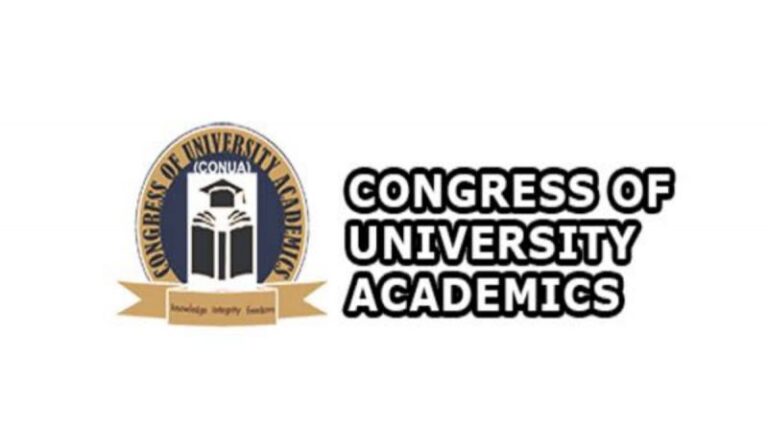The Congress of University Academics (CONUA) has urged the Federal Government of Nigeria to expedite action on resolving outstanding remuneration and welfare concerns affecting its members.
This came as the government commenced the payment of third-party deductions owed to its members.
In a statement signed by its National President, Niyi Sunmonu, the union said the release of the deductions was “a significant step towards resolving long-standing concerns” and a development that “contributes to rebuilding confidence in government–union relations.”
Mr Sunmonu noted that the payment followed months of formal engagements with the Office of the Accountant-General, the Ministry of Education and the Yayale Ahmed Renegotiation Committee.
FG moves to clear backlog
He stated that Nigeria’s President Bola Tinubu remained committed to resolving all lingering welfare and funding issues “in a transparent, fair and sustainable manner”.
ALSO READ: Alumni kick as Senate moves to strip ATBU of ‘technology’ status
The Federal Government, through the Ministry of Education, announced on 29 October the release of funds for tertiary institutions. The Minister of Education, Tunji Alausa, said the government had disbursed ₦2.3 billion as Batch 8 salary and promotion arrears to universities.
He stated that Nigeria’s president, Bola Tinubu, remained committed to resolving all lingering welfare and funding issues “in a transparent, fair and sustainable manner”.
According to a statement by the ministry’s Director of Press, Folasade Boriowo, the payment was processed through the Office of the Accountant-General as part of efforts to clear inherited backlogs.
Mr Alausa added that negotiations with unions were continuing under the Yayale Ahmed Committee, which he said was ensuring that issues were addressed through “honest and mutually respectful dialogue”.
He stressed that while the government was committed to improving staff welfare, it would only enter into agreements that were “realistic and financially sustainable”.
Congress presses for outstanding entitlements
While acknowledging progress with the settlement of the third-party deductions, CONUA said several unresolved items still threatened fairness and industrial stability.
On promotion arrears, the congress acknowledged the release of ₦2.3 billion but said verified submissions from universities showed the amount would not clear the full backlog. It urged the Federal Government to compute and release the balance to ensure no academics are excluded.
The union also drew attention to unpaid wage award arrears for January to December 2023, describing them as part of “low-hanging” issues earlier acknowledged by the minister and already presented to the Yayale Ahmed Committee.
It further described the continued withholding of three-and-a-half months’ salaries for its members as unjust, insisting that CONUA neither called nor participated in any strike action.
The statement said the withholding contradicted Section 43(1b) of the Trade Disputes Act, which protects workers during employer-initiated lockouts, and also violated the judgment of the National Industrial Court delivered on 25 July 2023, which affirmed CONUA’s independence.
ALSO READ: My predecessors don’t own houses, I’ve been building mine for 15 years – ASUU President laments
“We therefore sincerely urge the Federal Government to release these arrears as a matter of fairness, justice and respect for the rule of law,” Mr Sunmonu said.
Universities face staff shortage and mentorship gaps
The union noted that Nigerian universities continue to face critical human resource challenges, including widespread brain drain, a shrinking pool of young academics and worsening mentorship gaps.
Recruitment into academia, Sunmonu said, had fallen to its lowest level in decades due to poor remuneration and unfavourable working conditions.
“If this trend continues, the university system faces the real risk of collapse within the next decade,” the president warned.
CONUA recommended a remuneration structure that reflects present socio-economic realities, is regionally and globally competitive, meets at least the African continental average and restores dignity to the academic profession. It stressed that improved pay for academics is “not a luxury, but a national necessity”.
The union reaffirmed its commitment to constructive engagement and expressed hope that the payment of third-party deductions signalled sustained efforts by the government to conclusively resolve all outstanding welfare issues in the university system.


